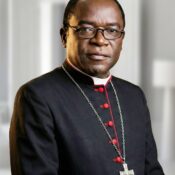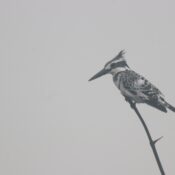
When Faith Meets Nature: How Religious Leaders in Delta State Are Championing Mangrove Conservation
On a warm Friday morning in August 2025, something truly inspiring happened in Ogulagha Community, Delta State. The Nigerian Conservation Foundation (NCF) brought together church leaders, herbal practitioners, and traditional faith representatives for a very unique purpose to talk about how faith and tradition can help protect one of nature’s most precious ecosystems: the mangroves.
Intersection of Mangrove & Faith
Mangroves are more than just trees growing in muddy waters. They are nature’s frontline defenders shielding coastlines from erosion, nurturing fish that sustain local livelihoods, and supporting an entire web of biodiversity. But like many natural habitats across Nigeria, mangroves face threats from deforestation, unsustainable fishing, and indiscriminate logging.
Recognizing this, NCF decided to approach the issue from a unique angle of faith and tradition. After all, in communities like Ogulagha, religious and traditional leaders hold enormous influence. Their teachings shape values, guide behavior, and often set the moral compass for entire communities.

Bringing Faith into the Conversation
The training session on Traditional and Faith-Based Dialogue for Mangrove Governance was not your usual environmental workshop. It was a powerful blend of spirituality, wisdom, and practical learning.
Nineteen religious leaders attended, including pastors, church founders, and even a respected herbal practitioner who specializes in plant-based remedies. Together, they explored how scripture and traditional knowledge can inspire environmental stewardship.
The Bible passages shared during the session spoke directly to this mission:
- Genesis 2:15 reminded everyone of humanity’s role to “dress and keep” the earth.
- Psalm 24:1 declared that “the earth is the Lord’s,” underscoring our duty to treat it with care.
- Leviticus 25:23–24 and Deuteronomy 20:19–20 offered guidance on land use and avoiding wasteful destruction.
- Proverbs 12:10 spoke to compassion for all living creatures.
Each verse became a call to action showing that caring for the environment is not just good practice, but also an act of faith and obedience to God.

Key Discussions and Community Reflections
Participants discussed how mangroves support both nature and people. They protect coastlines from flooding, provide breeding grounds for fish, and sustain livelihoods for entire communities. Yet, years of poor management have led to declining fish populations and coastal degradation.
Out of these conversations came real, community-based solutions:
- Bringing environmental messages into church sermons and teachings.
- Encouraging sustainable fishing and responsible harvesting.
- Reducing deforestation and logging in mangrove areas.
- Promoting community-led conservation among parish members.
The herbal practitioner in attendance added another layer to the conversation, explaining the medicinal importance of mangroves and why they must be harvested sustainably.
To support continued learning, participants received climate change manuals and children-friendly environmental magazines to use in their parishes and schools.
Faith in Action: The Prayer Walk and Church Engagement
The day ended with a moving moment when a community prayer walk from the town hall to the shoreline. Participants prayed for mercy for past unsustainable actions and asked for divine guidance to protect nature moving forward. It was a powerful blend of spirituality and environmental activism.
That same weekend, NCF was invited to preach in a local church. The message was simple but profound — taking care of the earth is an expression of love for God. The sermon encouraged everyone to make small, everyday choices that protect the environment, from reducing waste to caring for the mangroves that surround them.
The Impact So Far
The initiative has already sparked several promising outcomes:
- Heightened awareness: Religious leaders pledged to integrate environmental messages into their sermons.
- Collaborative action: Faith leaders, herbal practitioners, and community members agreed to work together to protect mangroves.
- Empowerment: Participants now understand how their faith connects to environmental stewardship.
- Spiritual engagement: The prayer walk and church sermon strengthened the sense of shared responsibility between people and creation.

A Step Forward for Faith-Based Conservation
The Ogulagha dialogue is proof that sustainable development is not just a matter for scientists and policymakers but a spiritual and moral calling too. When faith, tradition, and science come together, communities can find new purpose and energy to protect the earth.
The Nigerian Conservation Foundation’s work in Ogulagha shows that change often begins with conversations that speak to both the heart and the spirit. By engaging faith-based voices, the project has built a foundation for long-term conservation that feels authentic, inclusive, and deeply rooted in local values.
As one participant beautifully put it during the prayer walk, “Protecting creation is not just about saving trees, it’s about saving ourselves.”


